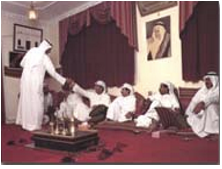
Arab culture and traditions, influenced by Islam, are the foundations upon which the modern State of Kuwait is based. The metamorphosis in lifestyle brought about by the discovery of oil did not change the identity of the people of Kuwait. The destruction brought on by the Iraqi invasion also did not shake the spirit of the Kuwaitis as they rebuilt their country in record time. The State of Kuwait has always paid special attention to the preservation of its culture and heritage by maintaining monuments and preserving artifacts and historical documents which are housed in The National
Museum. The destruction caused by the Iraqi troops created a heightened awareness among the people about the need to preserve and resurrect art in Kuwait. The new architecture of the city, which combines modern design with traditional art, reflects this awareness.
Kuwait has a large variety of customs and traditions, which gave rise to a colorful and extensive culture, reflected in the Diwaniya, the Bedouin traditions and Al Sadu weaving. The people of Kuwait also have special love for the arts, be it literature, theatre, music, dance, films or contemporary art. The National Council of Culture, Arts and Literature (NCCAL); The Free Art Studio and The Kuwaiti Society of Formative Artists are promoters of the visual arts in Kuwait.

A typical Kuwaiti house usually consists several bedrooms, a living room, kitchen, bathrooms and one hall where the traditionally held “Diwaniya” takes place.
This room or hall is excluded from other parts of the house and is an area where guests, neighbors and friends are received in order to discuss current events, where an exchange of views takes place along with good natured banter and its doors are kept open all day long.
This tradition is mainly reserved for men, but there are some female groups who have started their own kind of “Diwaniya” tradition. The name “Diwaniya” actually comes from the way one sits at this event and how the cushions are placed all along the walls of the room and the organization of the seating area.
The tradition of the Diwaniya has played a major role in Kuwait’s political and economic development as it was during many Diwaniya’s that major issues were discussed, and decisions took place. Modern Diwayniyas are equipped with television sets, computers, internet etc, where the mood that is present is one similar to a fun social event.
